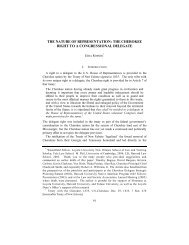Climbing Above the Culture Clash
Climbing Above the Culture Clash
Climbing Above the Culture Clash
You also want an ePaper? Increase the reach of your titles
YUMPU automatically turns print PDFs into web optimized ePapers that Google loves.
BU Law Looks at <strong>the</strong> Economy<br />
Leading From <strong>the</strong> Outside:<br />
Ivory Tower Offers Objective View of Economic Crisis, Says Hurley<br />
Four years ago, Cornelius “Con”<br />
Hurley arrived at BU with a vision.<br />
As <strong>the</strong> new director of <strong>the</strong> Morin Center<br />
for Banking and Financial Law, he<br />
wanted to make <strong>the</strong> 30-year-old graduate<br />
program into more than just an academic<br />
training ground for lawyers. He also<br />
wanted it to be a player on <strong>the</strong> national<br />
scene — a thought leader in <strong>the</strong> world<br />
of national and international finance.<br />
“The graduate program was already<br />
very successful,” said Hurley. “But <strong>the</strong>re<br />
was greater potential, and we made a<br />
conscious decision that it would be<br />
better for <strong>the</strong> Morin Center and for <strong>the</strong><br />
law school in general if we did more<br />
things that addressed <strong>the</strong> practical world.<br />
It’s fine to run a graduate program,<br />
but making a real contribution to <strong>the</strong><br />
ongoing debate is where it’s at.”<br />
His timing couldn’t have been better.<br />
Two years into his tenure, <strong>the</strong> bottom<br />
fell out of <strong>the</strong> world’s financial<br />
markets; several of <strong>the</strong> nation’s largest<br />
banks were poised to sink under <strong>the</strong><br />
weight of bad loans, threatening<br />
to pull <strong>the</strong> rest of <strong>the</strong> nation’s<br />
financial system down with <strong>the</strong>m.<br />
Suddenly banking law and regulation<br />
was no longer <strong>the</strong> esoteric concern of an<br />
elite club of experts, but of vital interest<br />
to every American. It was, and still is,<br />
<strong>the</strong> biggest economic plight facing <strong>the</strong><br />
United States since <strong>the</strong> Great Depression.<br />
With two years of preparation under<br />
Hurley’s leadership, <strong>the</strong> Morin Center<br />
was ideally positioned to step into<br />
<strong>the</strong> tumult. Hurley himself — a<br />
plainspoken man with a flair for<br />
cutting to <strong>the</strong> bones of an issue with<br />
an air of insightful congeniality — has<br />
become one of <strong>the</strong> go-to experts for<br />
media outlets around <strong>the</strong> country.<br />
Hurley said his position at <strong>the</strong> Morin<br />
Center puts him in a unique position<br />
to provide unbiased commentary,<br />
because he has no client interests to<br />
advocate for or political administrations<br />
to satisfy — yet he has decades<br />
of experience in <strong>the</strong> industry.<br />
Hurley sits with more than a dozen<br />
o<strong>the</strong>r lawyers on <strong>the</strong> American Bar<br />
Association’s task force on financial<br />
regulatory reform. It is this task force<br />
that will weigh in on reform issues<br />
on behalf of <strong>the</strong> legal profession and<br />
<strong>the</strong> ABA. According to Hurley, “Not<br />
having <strong>the</strong> ‘burden’ of client interests is<br />
quite useful as we consider <strong>the</strong> shape of<br />
<strong>the</strong> financial industry going forward.”<br />
Hurley brings this same approach to<br />
his service as an “independent director”<br />
of <strong>the</strong> Federal Home Loan Bank of<br />
Boston. One of his colleagues on that<br />
board, Arthur Connelly, chairman of<br />
<strong>the</strong> American Bankers Association,<br />
said, “We can count on Con to<br />
move <strong>the</strong> discussion in a positive and<br />
strategically helpful direction.”<br />
Said Hurley, “The ‘Ivory Tower’<br />
has become a pejorative term <strong>the</strong>se<br />
days, but <strong>the</strong> Ivory Tower is not<br />
such a bad perch for assessing what<br />
we’re going through right now.”<br />
The Morin Center oversees <strong>the</strong><br />
publication of <strong>the</strong> Review of Banking and<br />
Financial Law twice a year, co-sponsors<br />
a series of three-day financial CLE<br />
programs in partnership with <strong>the</strong> ABA,<br />
and hosts a lecture series that has featured<br />
some of <strong>the</strong> most powerful individuals<br />
in <strong>the</strong> financial world, including <strong>the</strong> vice<br />
chairman of Citigroup, <strong>the</strong> chairman<br />
of <strong>the</strong> New York Stock Exchange, and<br />
Congressman Barney Frank, chairman of<br />
<strong>the</strong> House Financial Services Committee.<br />
But without a doubt, <strong>the</strong> Morin Center’s<br />
most popular and timely program is<br />
“The Buck Starts Here,” a twice-amonth<br />
luncheon forum for lawyers,<br />
regulators and business leaders that uses<br />
a fast-paced and innovative format to<br />
stimulate insightful discussion of <strong>the</strong><br />
hottest financial topics of <strong>the</strong> moment.<br />
The two-hour program begins with a<br />
summary of <strong>the</strong> developments since<br />
<strong>the</strong> last session, followed by a “drill<br />
down” session on a particular hotbutton<br />
issue. It concludes with a Q&A<br />
session with panelists who include law<br />
firm partners, regulatory officials and<br />
business CEOs. Topics have ranged<br />
from Ponzi schemes to hedge fund<br />
regulation to <strong>the</strong> future of securitization.<br />
“Each session is videotaped and posted<br />
on <strong>the</strong> Morin Center’s Web site for <strong>the</strong><br />
whole world to see,” noted Hurley.<br />
One recent program focused on<br />
President Obama’s proposed Consumer<br />
Financial Protection Agency, specifically<br />
on a proposal to eliminate federal<br />
pre-emption laws so states could<br />
enact <strong>the</strong>ir own stricter regulations.<br />
The topic elicited a lively debate as<br />
to whe<strong>the</strong>r <strong>the</strong> plan would improve<br />
regulation — or create utter chaos.<br />
Fall 2009 | The Record | 11









